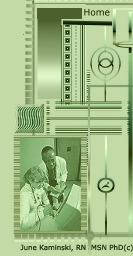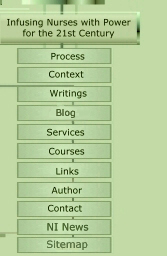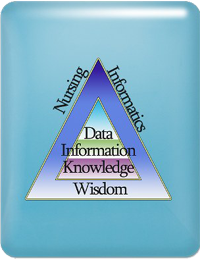Moodle: a User-Friendly, Open Source Course Management System
by © 2005 ~ June Kaminski, MSN PhD(c)
Citation:
Kaminski, J. (February, 2005). Editorial: Moodle – a User-Friendly, Open Source Course Management System. Online Journal of Nursing Informatics (OJNI), Vol. 9, No. 1 [Online]. Available at http://ojni.org/9_1/talktech.htm
Introduction
It would be a rare educator who has not been introduced to the recent wave of educational technology.Virtually, every education-related journal, course, and resource has some information related to using computers and technology for state-of-the-art teaching in educational environments at all levels. Greeted by some with open arms, technology also raises alarm bells in some educators for a variety of reasons. Some are concerned that teachers will be replaced with computers. Others have an aversion to technology in general while others have little time to master the skills necessary to even use a computer, let alone design a course or lessons on one.
The current advancement of technologically - supported learning is a key area of focus for all sectors of the educational system from kindergarten to post-secondary levels. Exponential advances in computers and technology - based educational applications have influenced education in both subtle and sweeping ways (Peters, 2002). These changes necessitate the involvement of educators in becoming cognizant of teaching and learning in new ways. If educators are to make informed decisions about the use of technology in the classroom, professional development initiatives are necessary (Bates, 2000).
Educators need information about the issues and advantages of using technology in the classroom. They need sources of accessible professional development to learn to work with various aspects of technology and to apply them successfully. The need for change can be a source of anxiety and frustration, especially if resources are not available. Both knowledge and practice are needed to begin to change and adapt teaching to an online environment. Practitioners need time to learn technology - related teaching skills, to learn how to use technology, to experiment with it and how to integrate it into the school curriculum. "Critical areas of agreement include a need for relevant, applicable professional development that reaches the widest possible range of groups and uses learning technologies as a delivery method." (Roberts & Associates, 1999, p. xxii).
One Possible Solution
Moodle http://moodle.org/ is a free, open source Course Management System (CMS) that is currently used by many universities, colleges, schools, companies and individual instructors. Time-tested and continually improving, this software offers a malleable online environment for teachers at all levels to shape into a meaningful and learner-friendly environment.
Moodle administration claim that the software is “an ongoing development project designed to support a social constructionist framework of education.” They further explain: “The word Moodle was originally an acronym for Modular Object-Oriented Dynamic Learning Environment, which is mostly useful to programmers and education theorists. It's also a verb that describes the process of lazily meandering through something, doing things as it occurs to you to do them, an enjoyable tinkering that often leads to insight and creativity. As such it applies both to the way Moodle was developed, and to the way a student or teacher might approach studying or teaching an online course. Anyone who uses Moodle is a Moodler.”
Social Constructivist Pedagogy is supported in Moodle through the availability of easily constructed environmental tools such as journals, private discussion boards, chat rooms, assignment, workshop and file exchange areas, quiz and survey support, mail integration and more. In other words, everything you need to create a secure, easily configured online course or program. The software comes with at least a dozen preprogrammed “themes” that offer different color schemes, navigation titling, and moods. Ample guidance is also available to help the creative course developer to customize the look of the course interface by changing the code on a couple of files. For instance, I modified the “standard red” Moodle layout theme to customize the course area at http://www.nursing-informatics.com/courses Nursing Informatics.com by altering the config.php, header.html, and footer.html files and adding some unique graphics. A completely different look was achieved on my http://www.healingintent.com/courses/ Healing Intent course site by altering the “standard white” theme graphics, titles and background colors.
The open source aspect of this software provides educators with the luxury of access, time, and a space to experiment and work on the aesthetics and functionality for a course without the issues of expense, deadlines or demand for performance or results. The Moodle community available from the software main site provides a fount of information, dialogue and brain-storming with other educators who are experimenting with and successfully using the software in every spectrum of the online education system.
The software is easy to install on any server with PHP and MySQL support. Full installation guidelines are available at http://moodle.org/doc/. As well, they offer a downloadable or web accessed teacher and developer manual as well as a coding guide for those skilled in code development. The software is also available in several different languages including English, French, Spanish, German, Japanese, Polish, Portuguese, Russian, Thai, Indonesian, Dutch, Turkish, and many more.
The Moodle software is a very valuable gift to the educational community. A gift that I would encourage every educator interested in developing savvy and skill in online course development to take full advantage of. You can work at your own pace and are in complete control of the environment. An environment that is perfect for experimentation and pedagogical exploration. Online education needs more of this: the personal touch of skilled educators and experts, applied within a software milieu that provides easy to use functionality and well-thought out interactive tools.
REFERENCES
Bates, A. (2000). Managing technological change: Strategies for college and university leaders. San Francisco: Jossey-Bass.Moodle (1999). Moodle Software, Documentation and Community. http://moodle.org
Peters, O. (2002). Distance education in transition: New trends and challenges. University of British Columbia.
Roberts & Associates. (1999). Professional development and learning technologies: Needs, issues, trends and activities. Report prepared for the Canadian Alliance of Education and Training Organizations Office of Learning Technologies and Human Resources Partnerships Directorate, Human Resources Development Canada. Ottawa: Minister of Public Works and Government Services Canada.
© June Kaminski Published: 2005.








